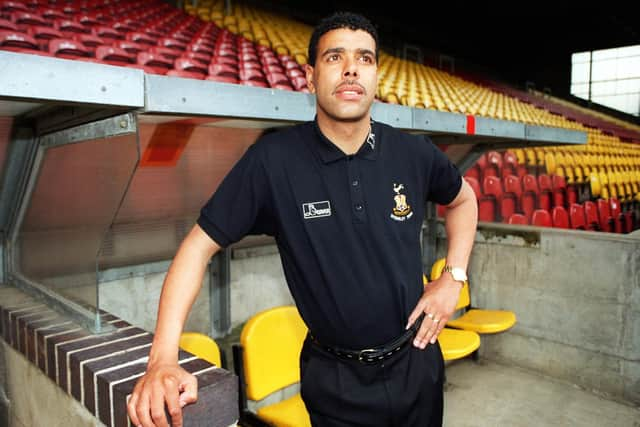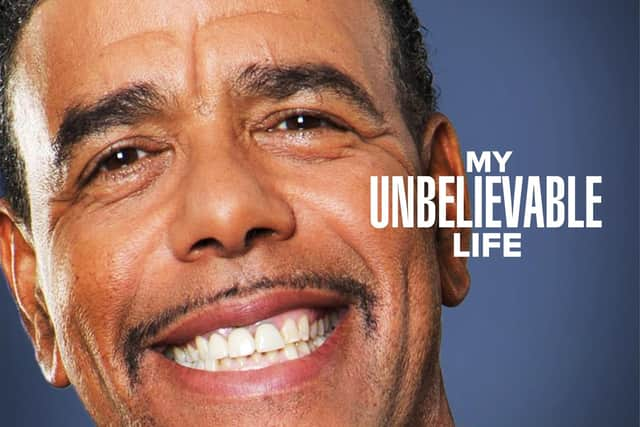Chris Kamara on learning from Howard Wilkinson as he lived his Leeds United dream, fulfilling his Middlesbrough ambition and why Bradford City will be back
Having learnt lessons at Elland Road which encouraged him into management with Bradford City, the Bantams hold a special place in his heart too.
As manager from 1995 to 1998, Kamara laid many of the foundations for their rise to the Premier League before working for chairman Geoffrey Richmond became too much.
Advertisement
Hide AdAdvertisement
Hide AdThese days City are in the bottom half of League Two, but speaking to The Yorkshire Post about his new autobiography Kammy, he insists the good times will return.
“The crowds are amazing,” says Kamara. “They need someone to put some money in and have faith in that place to realise its potential. It'll be back, these things go in cycles.”
Playing under Howard Wilkinson at Leeds pushed Kamara further towards coaching and although he only did one more job after Bradford – at Stoke City – before moving into television, he has nothing but good to say about his time there.
“I'd thought about management for a while because you do when you're getting near 30,” he says. “You think you might drive a taxi or run a pub. I thought I'd better start doing my coaching badges. I was watching Howard intensely and it gave me a real insight.
Advertisement
Hide AdAdvertisement
Hide Ad“Howard was the best manager I played for, years ahead of his time. Arsene Wenger gets credited for what he did at Arsenal with warm-downs, food, vitamins, shrinks and all that but Wilko was doing that sort of thing way before Arsene was even thought of in English football.”


Leeds were another club Kamara joined at the start of something special, helping them into Division One in 1990 but leaving in November of their 1991-92 title-winning season. If he learnt a lot from Wilkinson, the same was true of Gordon Strachan.
“He had this fella called Harold Oyen,” recalls Kamara. “He had parts on his body he used to stimulate before kick-off. I used to think, 'What on earth is he doing?' but when you become a manager studying ways to get the best out of players I realised it helped him at a not-so-young age to perform like a youngster.”
Kamara put that knowledge to good use at Valley Parade.
“Bradford was amazing,” he says. “I thought initially I would always be Lennie Lawrence's assistant. He signed me for Boro and Bradford.


Advertisement
Hide AdAdvertisement
Hide Ad“I came back from the 94 World Cup and asked, 'When can I start?' He said, 'Well, you can come training with us but the chairman won't pay you until August 1.' Eventually we agreed I could start two weeks before the season started.
“I loved working with Lennie. His man-management skills were great.
“Geoffrey Richmond gave me a player-coaching role then when Lennie fell out with Geoffrey he asked me to be caretaker. I said in our first meeting, blase, 'I'll get this team promoted.' We were three points off the bottom and we went on this fantastic run.
“After Bradford I struggled at Stoke. I picked my team for the first game and at four o'clock I got a call from the chairman, Peter Coates, to say I couldn't play my left-back Andy Griffin because Kenny Dalglish had signed him for Newcastle.
Advertisement
Hide AdAdvertisement
Hide Ad“It started badly and never got any better. I'll always regret that but if you change that, maybe I wouldn't be where I am today. I had a great career playing 22 years, then management, then I fell into TV.
“I had offers from Swindon, Gillingham and one other to get back in (to management) but my wife said, 'You're enjoying yourself, why go back to football?'”
Kammy looks back on his life and the health battle that reshaped it, but it all began with a playing career he takes huge pride in.
“When I was a kid, dreaming, I'd be watching Match of the Day at my mate's house,” he recalls. “Boro weren't on Match of the Day then so I was watching Leeds.
Advertisement
Hide AdAdvertisement
Hide Ad“I played for Alan Ingeldew's Sunday team, Beechwood, and he had season tickets at Boro and Leeds. I would go with Alan alternate weeks – not all the time – to Ayresome Park or Elland Road. That's why it became my ambition to play for Boro and my dream to play for Leeds. To achieve both was the best thing ever.”
To do it as a black man required a determination needed when he developed apraxia, which makes speaking difficult.
“Racism was accepted when I was a kid,” he says. “I thought I'd end up the whole of my life with that but it's got better. When I was growing up, people in the street would say the N word to your face – not on social media, hiding behind a pseudonym. That toughened you up.
“Then this (apraxia) comes along and I'm vulnerable and you start thinking I don't want to be a victim, I want to carry on as normal.”
Kammy: My Unbelievable Life is published by Macmillan, RRP £22.
Read part two of our interview as Kamara discusses his health how it drove him to suicidal thoughts here.